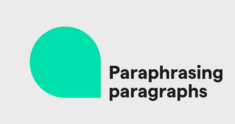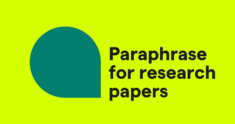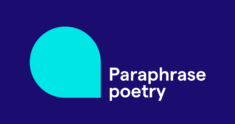
When you write, clarity should be one of your top priorities. This is the case for every type of writing. Clear writing that makes its point or purpose unmistakable and provides the reader with the appropriate amount of detail is strong writing. The opposite of clear writing is vague writing—something every reader has experienced and every writer should avoid.
What is vague writing?
Vague writing is writing that doesn’t communicate much, if it communicates anything at all. Take a look at these examples of vague writing:
- I was told I need to make some changes to my essay.
- They seemed to want another option.
Vague writing often leaves the reader with more questions than answers. In the first example, we’re left wondering who told the writer they needed to make changes to their essay. We also have no idea what changes they need to make or what the essay is about. With the second example, we have no idea who they are or which options they currently have. Because of the words seem to, we don’t even know whether they actually want another option.
Writing is communication, and the goal of communication is to be understood. Vague writing is difficult to understand, making it ineffective in many cases. The opposite of vague writing—clear writing—is strong writing because it effectively communicates with the reader.
Vague writing has a few hallmarks, including:
- Generic language
- A lack of structure
- Generalizations
You’ve likely encountered vague writing in a variety of settings. Have you ever received a text message from a friend that says, “meet me later, we’re going out”? If so, then you’re familiar with vague writing. After reading that text, you probably had follow-up questions: Where do they want to meet? When is “later”? Going out where?
Why is clarity important?
Clarity is important because it ensures that your reader understands exactly what you’re communicating, whether that’s a request, an observation, a question, a statement, or a response to a question they asked you.
Using clear language also makes your writing more convincing. This is important when your goal is to persuade your reader to take a certain action or to defend a point in your writing. When your language is clear, you’re perceived as more of an authority on your subject.
From a reader’s perspective, strong writing is more engaging than vague writing. Details paint a fuller picture for the reader to imagine. For example, in a poem or story, clear writing makes the narrative more immersive and encourages readers to picture its events unfold in their mind. In academic writing, like essays and research papers, detailed writing enables the reader to understand the topic.
How to make your writing tight and specific
Grammar is a key ingredient in clarity. A language’s grammatical rules aren’t arbitrary—they give writing and speech a structure that makes it easier for readers and listeners to understand. Think about why you need an antecedent before you use a pronoun or why double negatives are incorrect in English. Similarly, think about punctuation’s role in a sentence and what purposes rules like subject-verb agreement and verb conjugations serve.
This is why it’s so important to proofread and edit your work carefully: A grammatical mistake can change a sentence’s meaning or make it difficult to decipher the writer’s meaning. Take a look at this example:
- I love writing without it I wouldn’t have an outlet.
This sentence is confusing. You love writing without what? But make just a few minor grammatical changes, and the sentence becomes clearer:
- I love writing. Without it, I wouldn’t have an outlet.
A coherent paragraph structure also makes your writing clear. Focusing each paragraph on a specific concept or piece of supporting evidence for your position makes it easier for readers to understand the paper’s purpose and how its parts fit together to create a logical argument. This is where outlining your work before you start writing is most helpful—your outline is like a map, highlighting every key point and showing the path your writing will take from introduction to conclusion.
Word choice is another ingredient for strong writing. Typically, the most effective word to use is the most specific one. Compare these sentences:
- I’m taking a writing course next fall.
- I’m taking a creative writing course next fall.
- I’m taking a screenplay writing course next fall.
- I’m taking Intermediate Screenplay Workshop next fall.
Notice how much more information you can convey by choosing more specific words. The first sentence isn’t incorrect, but it’s vague. In academic and professional writing, using specific vocabulary reduces your likelihood of being misunderstood and having your words misinterpreted by your reader or raising questions about what you meant. In fiction and personal writing, word choice can also make your writing feel richer. Consider the difference between describing a character as a writer and describing them as a lifelong poet.
Clear writing also tends to be concise. That’s what we mean by “tight and specific.” When your writing is clear, you need fewer words to communicate your point. When you proofread your work, look for filler words like very, really, just, and totally. Sometimes, these words are necessary, but in many cases they aren’t.
Vague and clear writing examples
Vague:
- Real estate is a small industry; it’s not wise to make enemies.
- Please have that project done ASAP for the next meeting.
- I wrote a really great essay last semester.
Clear:
- Real estate is a tight-knit industry, so it’s in your best interest to maintain positive relationships with other realtors.
- Please have that grant proposal for the National Endowment for the Arts ready by Thursday for Friday’s meeting with the gallery director.
- Last semester, my essay on symbolism in Romantic poetry won a department award.
The same principles that apply to sentences apply to paragraphs. Here is an example:
Vague:
Writing essays is part of just about any course. When you write an essay, you show that you understand the material you learned in the course. Since most students take a number of courses per semester, they usually write a lot of essays.
Clear:
In college, expect to write essays in many of your courses, especially your humanities and social science courses. In an essay, you demonstrate your understanding of the course material by discussing a topic related to the coursework. Be sure to budget a sufficient amount of time to write and edit each essay you’re assigned, especially if you’re taking a full course load. As a full-time student taking four or five courses, you can expect to write two to three essays each week.
Keys to clear writing
Clarity in writing takes practice, but here are a few rules of thumb to keep in mind:
- Use specific language or examples.
- Get rid of vague, undetailed language and filler words.
- Use the right amount of information to make your point: Too little leaves the reader with questions, and too much obscures your purpose.
- Use correct grammar.
- Use transition sentences to connect paragraphs.
- Reread your writing through someone else’s eyes: Does it still make sense?






